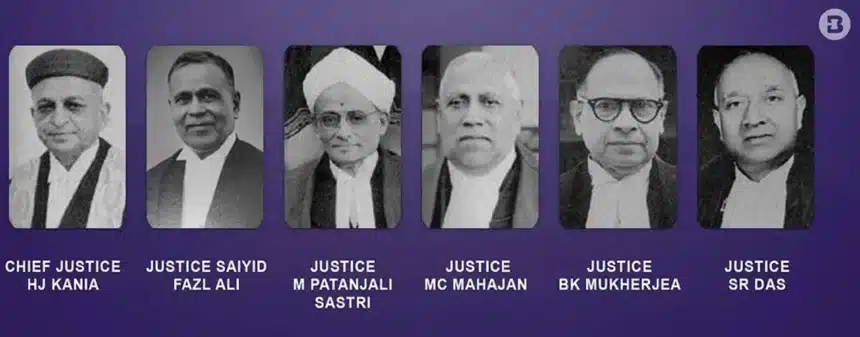Image Source: Twitter/Bar & Bench
Education and Early life
He was the son of Pandit Krishna Sastri, a senior Sanskrit pandit at Pachaiyappa’s College, Madras. He graduated in B.A. from Madras University in around 1910 before taking an LL.B in 1912 and becoming an advocate.
Career
Mandakolathur Patanjali Sastri started out as an advocate in the Madras High Court in 1914 and practiced for a while. Especially with Chettiar clients, he gained a reputation for special expertise in tax law. Because of his skills in the field, he was appointed standing counsel to the Commissioner of Income Tax in 1922; he held the position until he was elevated to the Bench on 15 March 1939. He, along with Sir Sidney Wadsworth, dealt with complicated cases that followed the Madras Agriculturists Debt Relief Act. He replaced Sir Srinivasa Varadachariar and was appointed to the Federal Court of India.
In 1947, he was made a judge of the Federal Court, which became the Supreme Court. Following the sudden death of the Chief Justice, Sir Harilal Kania, on 6 November 1951, Sastri was appointed Chief Justice. Satri served in the position until he retired on 4 January 1954.
Previously appointed pro-chancellor of Delhi University in 1953, he held that post until 1956. During his retirement, Sastri remained active with the Delhi chapter of the International Law Association and led the Airlines Compensation Commission that oversaw the nationalisation of India’s airlines. Furthermore, he served on the board of directors of the Press Trust of India. From July 1958 to April 1962, he served on the Madras Legislative Council. An eminent Sanskrit scholar and active member of the executive council of Benares Hindu University at the time of his death on 16 March 1963, he had chaired the Central Sanskrit Board since 1959, as well as the Kendriya Sanskrit Vidya Pith at Tirupati. He had a cardiac arrest at his son-in-law’s house in Delhi. Avanidhar Subrahmanyam, Distinguished Professor at the University of California, Los Angeles, and Mandakulutur Subramanya Ganesh, Head of Oncology at Vydehi Institute of Medical Sciences, Bengaluru, are his grand grandchildren.
Read Also: Sanskrit and its usefulness to humanity

